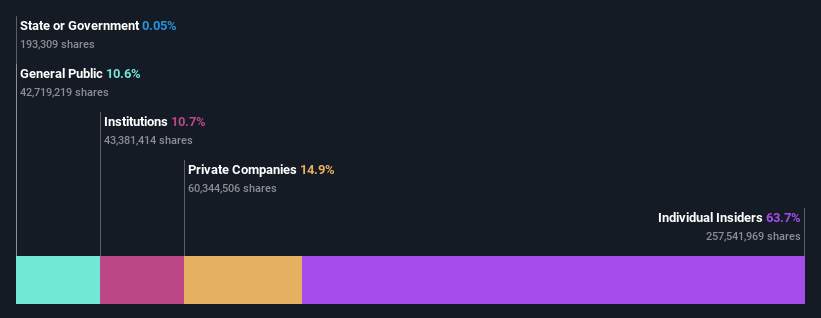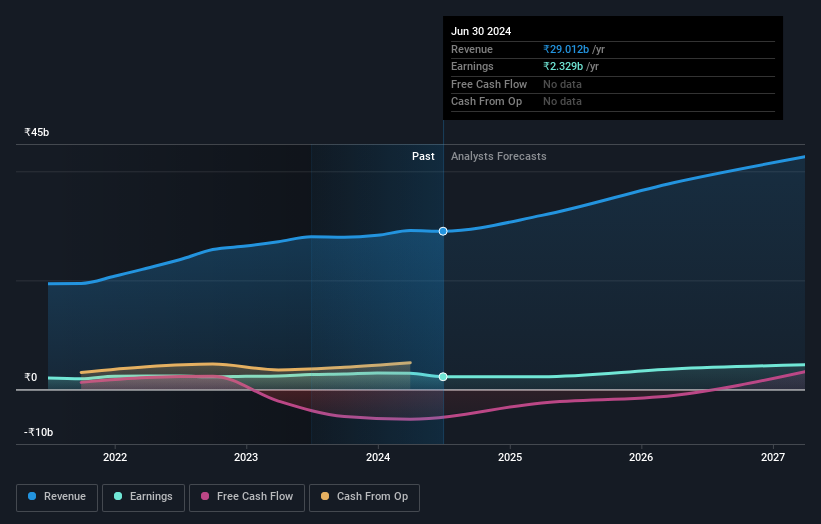- India
- /
- Basic Materials
- /
- NSEI:STARCEMENT
Insiders have been selling Star Cement Limited (NSE:STARCEMENT) recently yet still hold a significant stake; 8.1% drop last week not ideal

Key Insights
- Significant insider control over Star Cement implies vested interests in company growth
- A total of 8 investors have a majority stake in the company with 52% ownership
- Insiders have been selling lately
Every investor in Star Cement Limited (NSE:STARCEMENT) should be aware of the most powerful shareholder groups. The group holding the most number of shares in the company, around 64% to be precise, is individual insiders. In other words, the group stands to gain the most (or lose the most) from their investment into the company.
Despite selling some shares recently, insiders control a good portion of the company's stock. As a result, the group bore the brunt of last week’s ₹6.7b market cap loss.
In the chart below, we zoom in on the different ownership groups of Star Cement.
Check out our latest analysis for Star Cement

What Does The Institutional Ownership Tell Us About Star Cement?
Institutions typically measure themselves against a benchmark when reporting to their own investors, so they often become more enthusiastic about a stock once it's included in a major index. We would expect most companies to have some institutions on the register, especially if they are growing.
We can see that Star Cement does have institutional investors; and they hold a good portion of the company's stock. This can indicate that the company has a certain degree of credibility in the investment community. However, it is best to be wary of relying on the supposed validation that comes with institutional investors. They too, get it wrong sometimes. When multiple institutions own a stock, there's always a risk that they are in a 'crowded trade'. When such a trade goes wrong, multiple parties may compete to sell stock fast. This risk is higher in a company without a history of growth. You can see Star Cement's historic earnings and revenue below, but keep in mind there's always more to the story.

Hedge funds don't have many shares in Star Cement. From our data, we infer that the largest shareholder is Sajjan Bhajanka (who also holds the title of Top Key Executive) with 12% of shares outstanding. Its usually considered a good sign when insiders own a significant number of shares in the company, and in this case, we're glad to see a company insider play the role of a key stakeholder. For context, the second largest shareholder holds about 10% of the shares outstanding, followed by an ownership of 5.8% by the third-largest shareholder. Interestingly, the second-largest shareholder, Prem Bhajanka is also Senior Key Executive, again, pointing towards strong insider ownership amongst the company's top shareholders.
We also observed that the top 8 shareholders account for more than half of the share register, with a few smaller shareholders to balance the interests of the larger ones to a certain extent.
While it makes sense to study institutional ownership data for a company, it also makes sense to study analyst sentiments to know which way the wind is blowing. There are plenty of analysts covering the stock, so it might be worth seeing what they are forecasting, too.
Insider Ownership Of Star Cement
The definition of company insiders can be subjective and does vary between jurisdictions. Our data reflects individual insiders, capturing board members at the very least. Management ultimately answers to the board. However, it is not uncommon for managers to be executive board members, especially if they are a founder or the CEO.
Most consider insider ownership a positive because it can indicate the board is well aligned with other shareholders. However, on some occasions too much power is concentrated within this group.
It seems that insiders own more than half the Star Cement Limited stock. This gives them a lot of power. So they have a ₹49b stake in this ₹77b business. Most would argue this is a positive, showing strong alignment with shareholders. You can click here to see if those insiders have been buying or selling.
General Public Ownership
The general public, who are usually individual investors, hold a 11% stake in Star Cement. While this size of ownership may not be enough to sway a policy decision in their favour, they can still make a collective impact on company policies.
Private Company Ownership
We can see that Private Companies own 15%, of the shares on issue. Private companies may be related parties. Sometimes insiders have an interest in a public company through a holding in a private company, rather than in their own capacity as an individual. While it's hard to draw any broad stroke conclusions, it is worth noting as an area for further research.
Next Steps:
It's always worth thinking about the different groups who own shares in a company. But to understand Star Cement better, we need to consider many other factors. Consider risks, for instance. Every company has them, and we've spotted 1 warning sign for Star Cement you should know about.
Ultimately the future is most important. You can access this free report on analyst forecasts for the company.
NB: Figures in this article are calculated using data from the last twelve months, which refer to the 12-month period ending on the last date of the month the financial statement is dated. This may not be consistent with full year annual report figures.
New: Manage All Your Stock Portfolios in One Place
We've created the ultimate portfolio companion for stock investors, and it's free.
• Connect an unlimited number of Portfolios and see your total in one currency
• Be alerted to new Warning Signs or Risks via email or mobile
• Track the Fair Value of your stocks
Have feedback on this article? Concerned about the content? Get in touch with us directly. Alternatively, email editorial-team (at) simplywallst.com.
This article by Simply Wall St is general in nature. We provide commentary based on historical data and analyst forecasts only using an unbiased methodology and our articles are not intended to be financial advice. It does not constitute a recommendation to buy or sell any stock, and does not take account of your objectives, or your financial situation. We aim to bring you long-term focused analysis driven by fundamental data. Note that our analysis may not factor in the latest price-sensitive company announcements or qualitative material. Simply Wall St has no position in any stocks mentioned.
About NSEI:STARCEMENT
Star Cement
Manufactures and sells cement and clinker products in India and internationally.
Reasonable growth potential with adequate balance sheet.
Similar Companies
Market Insights
Community Narratives



